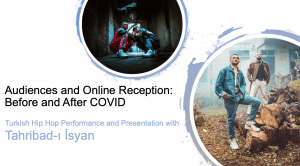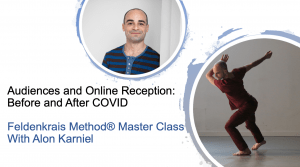There are few things that feel satisfying or like good translations for connecting with people in our Covid-circumscribed videoconferencing world. But on November 2, 2020, we were thrilled when participants in Audiences and Online Reception experienced a connective Internet-kinesthetic experience during dance artist Alon Karniel’s master class in The Feldenkrais Method®. This somatic practice, developed by Russian-Israeli movement theorist Moshe Feldenkrais, focuses on practitioners heightening their attention to small actions in their bodies through minimal effort to foster sensitivity, being in the moment, and a pleasant experience. Karniel guided us through an Awareness Through Movement® Feldenkrais session on Zoom, and then answered questions about what it has been like to be a working artist during the pandemic. His instruction midway through class, as we coordinated the biomechanics of sliding one palm against the surface of the opposite thigh that itself was wrapped around the other leg, “There is no prize at the end of the movement,” reminded us to attune fully to the moment. Taking a proverbial step back, this instruction to do a thing fully bolsters our reserve against other encounters that come. This moment reminded me of dance theorist Ann Cooper Albright’s discussion about how somatic practices can train us for social justice.
Even though I was lying on a mat in my living room by myself, I felt as though Karniel was right there with me, his instructions so clear and themselves so kinesthetically descriptive that it felt like we were in the same room together. When he gave guidance to the group, I felt the attentive presence of the other people in the class with me as well. Some of the questions we are asking in Audiences and Online Reception are about “after Covid.” While many aspects of dancing and audiencing have not made satisfying transitions to the screen, it was gratifying to feel that Karniel’s Feldenkrais class did, with the ease and release of effort that he stressed in doing the biomechanical sequences. After Covid, we are going to make choices in our hybrid world. We will choose to return to doing some things in person, and we will choose to continue doing some things online. One of the possibilities that Covid has created, paired with the development of videoconferencing technology, is that we can be connected to Karniel in Tel Aviv and take his class there from our internet portal in Ohio, during and after the pandemic.
During Covid, Karniel is teaching, rehearsal directing, and working with students in Haifa and Jerusalem in addition to his home base in Tel Aviv. Israel has gone through patterns of lockdowns and openings, lockdowns and openings since March 2020. This rollercoaster of allowances and restrictions specifically pertaining to theaters have deeply affected Karniel’s teaching work. During the discussion session after his class, Karniel described the effort to bring a dance to performance that he had worked on staging with students for nearly a year. First they were going to perform in a theater with an in-person audience; then without the audience and without the dancers being able to touch or be close to each other; then in a studio with an in-person audience; then in a studio without an audience. Finally, they were allowed to perform the work without any audience members in the studio space, so they filmed it. Karniel mentioned the extra effort it took to rechoreograph the movement patterns to comply with the no-touch, no-partnering restrictions, then to transform a dance made for a theatrical stage to a studio space, and then again still for the camera. Karniel’s experiences are common across Israeli theatrical dance companies during the pandemic thus far. Dance writer Deborah Friedes Galili discussed what it felt like to experience a studio performance of Batsheva Dance Company in Tel Aviv during the narrow window in which Israeli restrictions briefly lifted so that audiences could attend dance performances: the excitement of being kinesthetically together again, and the anxiety about virus transmission. As we look toward what this landscape may turn out to be, the potential for remaining connected through practices like Feldenkrais and Karniel’s teaching offer possibilities for navigating this as-yet uncertain future.



